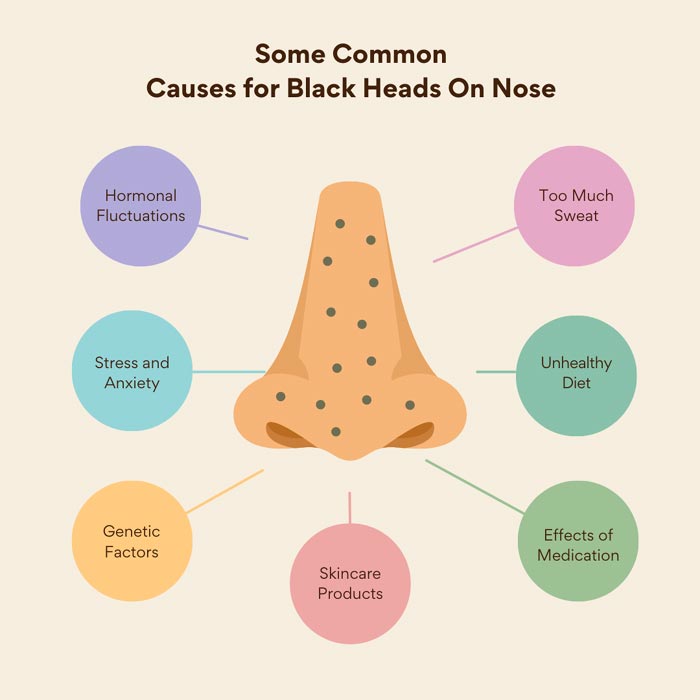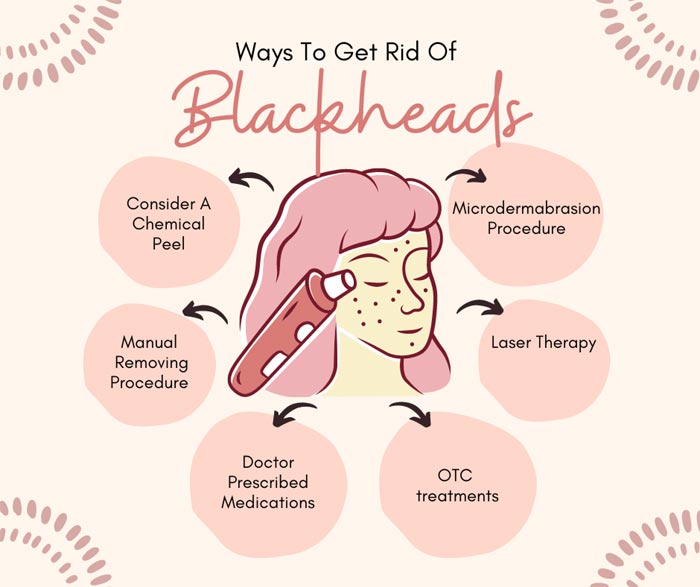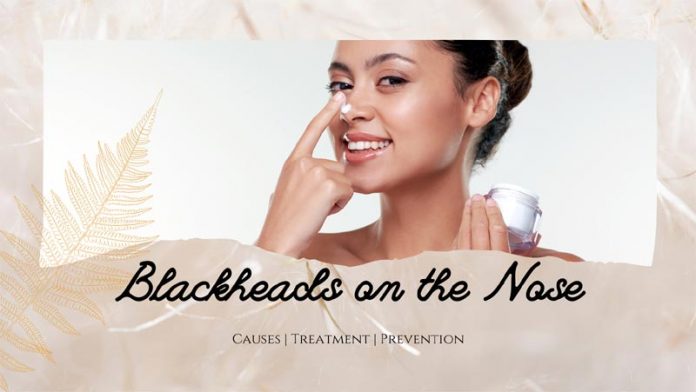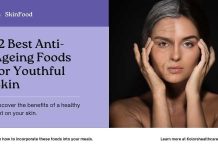Are you surprised by the appearance of tiny black specks on the nose? Well, you are not alone. Though these annoying blotches look like tiny freckles, they are called blackheads, a common skin issue. Blackheads can affect people of all age groups and skin types. However, they are not small pits of dirt stuck in your skin pores. They are a mild type of acne that develops on your nose due to the pore density and excess oil production.
What Are Blackheads?
Blackheads begin to form when the skin pores are clogged due to materials such as excess sebum, bacteria, dirt, and traces of makeup. They are a non-inflammatory kind of acne and are called open comedones. When the impurities in these open comedones interact with oxygen, it changes into black, giving them a blotched look. They are not contagious, which means they don’t spread from one person to another through skin contact.
Understanding Blackheads: Symptoms and Identification
There is no need to visit a dermatologist to recognize the blackhead, as they are easy to spot. Use a hand mirror and bring it close to your nose. If tiny black dots are on the tip and sides of your nose, it indicates you have blackheads. No symptoms are associated with blackheads on the nose, as they don’t have itchiness, inflammation, or pain. Besides an unsightly appearance, blackheads do not indicate any underlying medical condition. If you find any signs listed below, you have black pores on your nose.
- The appearance of black-colored and brown-colored spots on the nose
- Flat-looking black blotches with a slight, raised look
- Your nose looks unsightly with a lot of black spots
- Enlarged pores in black with no pain or discomfort
Reasons / Causes for Black Heads On Nose

No single reason causes the appearance of blackheads on the nose, as many factors can contribute to it. Some of the key factors that cause blackheads on the nose are:
1. Hormonal Fluctuations
Changes in hormone levels during puberty will lead to a spike in natural oils in your face. This is due to the excess production by the sebaceous glands. During puberty, the androgen hormone levels are high in boys and girls, which kindles the sebum secretion. Such hormonal changes are common during mensuration, pregnancy, and while using birth control pills, which might also cause blackheads on the nose.
2. Too Much Sweat
If you are living in regions with hot temperatures and high humidity levels, it is natural to experience excessive sweating. Sweating a lot leads to too much oil production, which in turn causes the black pores on the nose to develop.
3. Stress and Anxiety
If you are a student or working under tight schedules, you might be stressed and anxious. Stress factors can kindle the sebaceous glands to produce excess oil, which might be the reason behind your blackheads on the nose.
4. Unhealthy Diet
Some foods in your diet might contain a high amount of oil, sugar, or fat, affecting your skin health. Following a diet that lacks nutrition and minerals will accelerate the blocking of pores, which, in turn, causes black pores on the nose.
5. Smoking
If you have the habit of smoking, the presence of chemicals in the cigarettes like nicotine will alter the composition of sebum. When this sebum composition changes, it causes the development of blackheads on the nose.
6. Genetic Factors
If one of your parents has the blackheads issue, you might also be prone to developing it. Your genetics play a crucial role in influencing the androgenic hormone level, such as 5-DHT, which triggers the development of black pores on the nose.
7. Side Effects of Medication
A few medications that you are regularly popping to relieve chronic medical conditions might trigger these tiny black pores on your nose. Specific medications that contain corticosteroids, lithium, testosterone, or estrogen might lead to blackheads on the nose as a side effect.
8. Skincare Products
Using comedogenic makeup products and cosmetic items might block your skin pores, leading to blackheads. Men tend to develop blackheads on the nose due to various activities like shaving.
How to Remove Blackheads from the Nose?

Following any of the methods mentioned below will help you get relief from blackheads and flaunt flawless skin. They are:
1. OTC treatments
As the blackheads on nose fall under Grade 1 acne type [1], your dermatologist might recommend using OTC products like pads, gels, and creams that can be applied on your nose directly. These products have powerful ingredients like resorcinol, benzoyl peroxide, retinoid [2], and salicylic acid. These ingredients combat bacteria, prevent excess oil production, and let your skin shed dead cells.
2. Doctor Prescribed Medications
If the blackheads on your nose aren’t responding to the OTC products, your dermatologist might suggest more robust options. Medications with vitamin A prevent buildup in the follicles of facial hair and improve the pace of cell turnover. These medications might have ingredients like adapalene, tazarotene, or isotretinoin [3]. If you have developed pimples or cysts and black pores on your nose, your doctor might include antibiotics and topical medicines with benzoyl peroxide for effective relief.
3. Salicylic Peel
Chemical peels like salicylic Peel can help eliminate dead cells and unclog skin pores that cause blackheads. It is a mild peel that can get rid of blackheads quickly. It involves the application of the salicylic solution on your skin to remove the top layer to reveal baby-soft skin beneath gradually.
4. Microdermabrasion Procedure
During this procedure, your topmost skin layer will be scrubbed off using a special tool. This process eliminates black pores and unclogs the pores. Sometimes, it can worsen the blackheads issue among a few individuals by thickening the skin’s top layer. So, always seek professional advice before choosing any blackhead treatment.
5. Manual Removing Procedure
Your dermatologist will remove these blackheads with the help of a comedone extractor with a rounded tip. It is a gentle method that removes the blocks in your pores by applying pressure. Choose the services of an expert to get the blackheads removed safely.
6. Laser Therapy
This laser therapy procedure utilizes short, tiny beams of intense laser light for lowering oil production and killing harmful bacteria [4]. The laser light can penetrate deep skin layers to treat acne and blackheads on the nose without causing any damage to the top skin layer.
Preventing Blackheads On the Nose
- Invest in an oil-free face wash with a mild formula to wash your face two times a day.
- Use warm water to wash your face to remove excess oil.
- Don’t forget to remove your makeup every day before hitting the bed.
- Keep your hands off the face to prevent grime and oil buildup on pores.
- Choose only non-comedogenic products to prevent blackheads and acne breakout.
- Exfoliate your face regularly with mild abrasive scrub to remove dead cells and prevent them from accumulating.
- Use pore strips for the nose once a week, as they remove blackheads, shrink the pores, and offer a polished look.
- Using face masks regularly with ingredients like charcoal and clay will help detoxify, cleanse, and soften the skin to prevent blackheads on the nose.
- Do not forget to use a gel-based sunscreen that is not oil-based to prevent black pores.
- Avoid squeezing a blackhead, as it can spread the bacteria and cause skin irritation, inflammation, and scars.
Though blackheads on the nose are a common skin issue, it affects several people, especially teenagers undergoing a transition to adulthood. If your blackheads keep spreading over your nose and causing an unsightly appearance, consult a dermatologist for relief. You can also seek professional treatment if the black pores on the nose don’t respond to OTC creams or gels.
References
- U.S. Food and Drug Administration – https://www.niams.nih.gov/health-topics/acne#tab-causes
- Department of Dermatology, University of Pennsylvania School of Medicine – https://www.ncbi.nlm.nih.gov/pmc/articles/PMC5574737/
- Universidade Federal de São Paulo – https://www.ncbi.nlm.nih.gov/pmc/articles/PMC6383843/
- University Hospital of Wales, Welsh Institute of Dermatology – https://www.ncbi.nlm.nih.gov/pmc/articles/PMC6457763/









